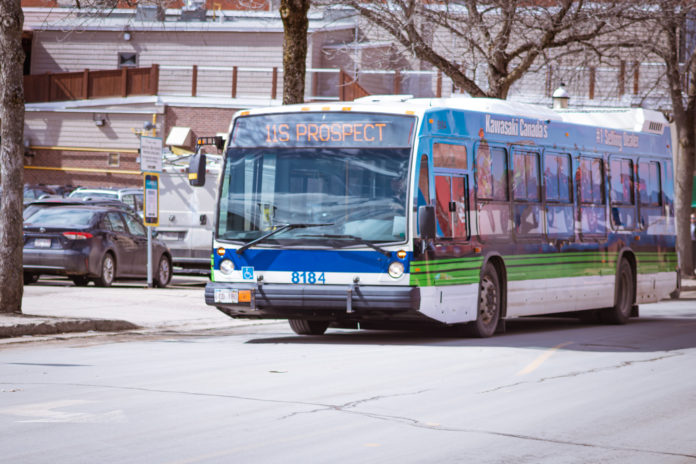
As the St. Thomas University Students’ Union two-year contract with Fredericton Transit for the bus pass ends, new plans were negotiated and sent to the city. Though the deal isn’t finalized, STUSU and the City of Fredericton reached a tentative agreement to maintain the current deal regarding bus passes for the next two years.
Under the current agreement, students pay $95 for the bus pass as part of their student fees on top of their tuition. This year, STUSU added a clause that allowed students to opt-out of the bus pass if they weren’t in Fredericton because of COVID-19. Matthew Oram, STUSU vice-president administration, said the same clause will be kept if STU stays fully online or adopts a hybrid learning model for next year.
Oram said part of this decision came from the lack of data of students using the bus because of the pandemic. STUSU and the city work with the company, Hotspot, to deal with the data surrounding bus usage.
“As of right now, [it’s] the status quo we’re staying with until we get further stats from Hotspot on how many students use the bus,” said Oram.
Two more options being discussed regarding the bus pass were opt-in or opt-out plans. This means instead of students collectively paying for the bus passes, an opt-in would allow students to choose to get a bus pass and an opt-out option would give students the option to not get the bus pass.

Oram said the problem with those options is that the fees would go “through the roof” because fewer people are using the bus pass. At the STUSU meeting on March 21, he said depending on the option, the fee could spike to $175 or even $200 and continue to rise over the years.
He said keeping the terms the same for next year was the best case scenario in terms of funding and fees.
“We want to keep the fees as low as possible,” said Oram. “In the future, opting out, that process is something we might look at.”
He said part of these discussions also included students having access to the bus pass and students dealing with financial difficulties due to the pandemic.
Essma Hassan is a fourth-year STU student majoring in sociology and going into the bachelor of education program next year. Growing up in Ottawa, she said she used to take the bus everywhere. Hassan didn’t have a car in her first year, but had one after. While she was without a car, she said she still hardly used the bus because she lived in residence and would either walk or carpool with friends.
“I found the bus system so inefficient and I found it difficult to navigate,” said Hassan. “I got my car in second year and since then, I haven’t even touched my bus pass.”

When she first heard about the opt-in and opt-out options, Hassan said she was immediately on board. She said she’d love to use the money she’d spend on the bus pass towards her car payments or her parking pass.
During the STUSU meeting on March 21, the sexuality and gender diversity representative and next year’s president, Tyler MaGee, said everyone had their own standpoint.
He said STUSU collectively agreed that keeping with the current model was in the best interest of students in terms of costs. Though initially, MaGee said he was on board with the opt-in, opt-out option.
“Throughout the discussions, we realized as far as cost efficiency and what that would mean to the wallets of students, it turned out to not be the most feasible of options,” said MaGee in an interview with The Aquinian.
He said another reason for sticking with the current model is student accessibility. MaGee said since STU is likely going back to in-person classes next year, they have to consider actually bringing students to campus.
“That puts another layer on top of this bus pass thing.”
